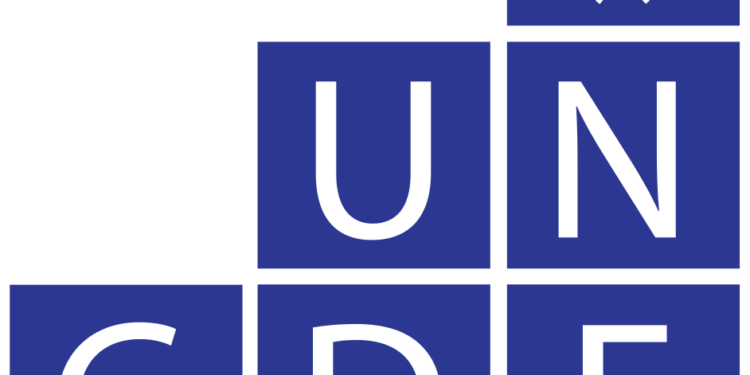In Gaberi village, Falwel Commune, rural Niger, Aissa Amarou now feeds her family with nutritious meat and has covered her children’s school costs for an entire year thanks to her new goat herd. Ms Amarou is one of hundreds of thousands of Nigeriens taking part in a UN Capital Development Fund initiative under the Local Climate Adaptive Living Facility, which channels grants to local governments for small-scale investments in individuals, communities and projects that are transforming people’s ability to adapt to the impacts of climate change.
Just over a year ago, Ms Amarou received a goat rearing kit and training on how to rear and tend to her burgeoning herd, financed with a LoCAL grant received by her local government. Participating in the project has proved transformative for Ms Amarou and her six children as she quickly grew her herd, enabling her to have some for food and sell others for profit.
“I received a goat-rearing kit consisting of two females and a male. The females gave birth to two male goats and three female goats,” said Ms Amarou.
“I sold the two male goats to buy school supplies for the children, and the rest is used for family expenses.”
The goat-rearing and training investment is just one of hundreds of small investments being made in Niger that, cumulatively, are improving communities’ resilience to the impacts of climate change. Thus, reconditioning and creation of new wells have improved access to water in Falwel and saw the number of cattle increase by 50% in just six months. Communal cereal banks have improved food supply and security for entire communities. Investments in nature-based and indigenous land regeneration and restoration methods have strengthened farming communities’ ability to minimise the threat of bushfires and improve soil quality.
Ms Amarou is one of 125 highly vulnerable women in her community participating in the goat-rearing project. In total 640 women in nine communes received goat-rearing kits and training, paid for by their local governments after receiving a LoCAL Performance Based Climate Resilience Grant. Across Niger, communities with a combined population of 668,495 people have benefitted from an array of climate resilient investments, designed to strengthen local level adaptation to the impacts of climate change.
Niger, a landlocked country in the Sahel region of West Africa, is one of the most climate vulnerable countries in the world which is being exacerbated by growing regional insecurity. The country faces severe rise in temperatures, erratic rainfalls, frequent droughts, floods, desertification, and locust infestations. Climate change is worsening food insecurity, water scarcity, conflict and humanitarian crises in a country where more than 80% of the population relies on farming and herding for their livelihoods.
To cope with these challenges, Niger has been implementing various locally led actions for climate adaptation, with the support of national and international partners. One of these initiatives is the LoCAL Facility, a UNCDF designed and managed mechanism that provides performance-based grants to local governments to finance small to medium-sized adaptation investments that meet local needs.
LoCAL-Niger launched in 2014 with a pilot phase carried out in two municipalities in the Dosso region. This pilot phase had positive feedback, particularly on improving food security and led the government and UNCDF to extend LoCAL to 9 communes in three regions. Since 2014, LoCAL-Niger financed 64 adaptation investments, directly benefiting approximately 118,000 people in some of the world’s most vulnerable and conflict affected areas of the world.
The Mayor of Falwel Commune, 65-year-old Amadou Boukata, has seen the impact of LoCAL in his community and appreciates the cross-cutting benefits of the approach.
“We now have 120 km of firebreak strips, 20 hectares of land rehabilitated, the rehabilitation of the well in Gaberi and the drilling of a new well,” said Mr Boukata, an approach that he believes is helping to reduce outward migration from his community, particularly among younger constituents.
“These activities benefitted 3,042 people including 1,552 women and, in the process, it created 115 temporary jobs for three months,” said Mr Boukata. “This made it possible to settle young people and reduce the exodus of young people during this period.”
For Mr Boukata, the adaptation focused grants have improved the daily lives of youth and women in the community and this has had many positive ripple effects.
“The rehabilitation and drilling of the wells created a certain cohesion among the population, because they are well used – not only by the pastoral population of Gaberi but also by nomadic pastoral herders. This made it possible to strengthen ties between populations, creating peace and social cohesion within this community.”
Niger has suffered a rise in instability and conflict in recent years, with growing incidents of livestock looting, burning of grain stores and markets as well as killing and abductions of farmers. Clashes between sedentary farmers and pastoral groups are regularly reported by the UN Office for the Coordination of Humanitarian Affairs (UNOCHA). Growing insecurity combined with the impacts of climate change are resulting in a rise in humanitarian needs in Niger and neighbouring Burkina Faso and Mali, according to the International Rescue Committee.
The well in Gaberi is one of the 20 village wells facilitated by LoCAL, giving better access to drinking water throughout the year to 21,257 people, including Hadiza Ali, a 60 years old and mother of seven children, who is the president of the well’s management committee.
“Before the rehabilitation of the wells, the women had to go to Falwel – 1.5km from the village – to fetch water. Sometimes children fought on the road and many times children left for school late. But since the rehabilitation of the well, we have been consuming quality water. Attendance at school is not disrupted. The well is frequented by several communities-Peulh, Tuareg, Zarma and nomadic herders – in fraternity and social cohesion.”
Distributed by APO Group on behalf of United Nations Capital Development Fund (UNCDF).









